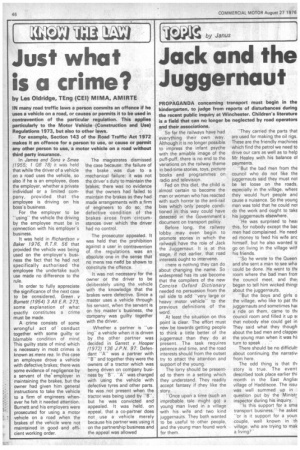Jack and the Juggernaut
Page 48

If you've noticed an error in this article please click here to report it so we can fix it.
PROPAGANDA concerning transport must begin in the kindergarten, to judge from reports of disturbances during the recent public inquiry at Winchester. Children's literature is a field that can no longer be neglected by road operators and their associations.
So far the railways have had everything their own way. Although it is no longer possible. to impress the infant psyche with the amiable image of the puff-puff, there is no end to the variations on the railway theme in bed-time stories, toys, picture books and programmes on radio and television.
Fed on this diet, the child is almost certain to become the man or woman who has reacted with such horror to the anti-rail bias which only people conditioned in this way could have detected in the Government's document on transport policy.
Before long, the railway lobby may even begin to promote stories in which the railways have the role of Jack the Juggernaut. It is at this stage, if not earlier, that road interests ought to intervene.
I here is nothing they can do about changing the name. So widespread has its use become that the compilers of the new Concise Oxford Dictionary needed no persuasion from the rail side to add "very large or heavy motor vehicleto the previous definitions of the word.
At least the situation on this point is clear. The effort must now be towards getting people to think a little better of the juggernaut than they do at present. The task requires patience and time, and the road interests should from the outset try to attact the attention and support of the young.
The lorry should be presented to them in a setting which they understand. They readily accept fantasy if they like the story.
"Once upon a time (such an improbable tale might go) a young man lived in a village with his wife and two kind juggernauts. They both wanted to be useful to other people, and the young man found work for them. "They carried the parts that are used for making the oil rigs. These are the friendly machines which find the petrol we need to drive our cars as well as to help Mr Healey with his balance ol payments.
-But the bad men from the council who do not like the juggernauts said they must not be let loose on the roads, especially in the village, where they would hurt people and cause a nuisance. So the young man was told that he could not do the work and ought to take his juggernauts elsewhere.
"He was surprised to heal this, for nobody except the bac men had complained. He need. ed money to feed his wife anc himself, but he also wanted tc go on living in the village witlhis friends.
"So he wrote to the Queen and she sent a man to see wha could be done. He went to thE room where the bad men frorr the council meet, and the) began to tell him wicked thing( about the juggernauts.
"But the boys and girls o the village, who like to pat th( juggernauts and sometimes hac a ride on them, came to th( council room and filled it up s( that nobody else could get in They said what they though about the bad men and clapper the young man when it was hi! turn to speak . . ."
There should be no difficult' about continuing the narrativi from here.
The odd thing is that th, story is true. The event described took place earlier thi month in the East Anglia' village of Haddiscoe. The issu, was well summed up in question put by the Ministr inspector during his inquiry.
"Is this support for a sma transport business," he askec "or is it support for a youn couple, well known in th village, who are trying to mak a living?"




















































































